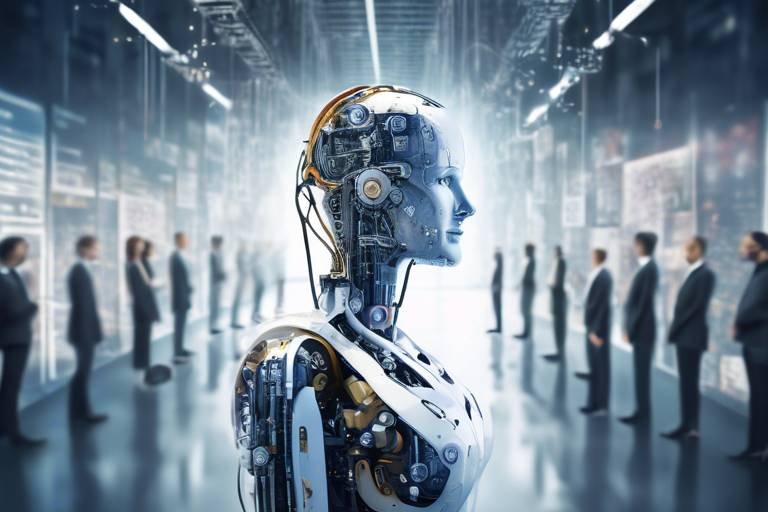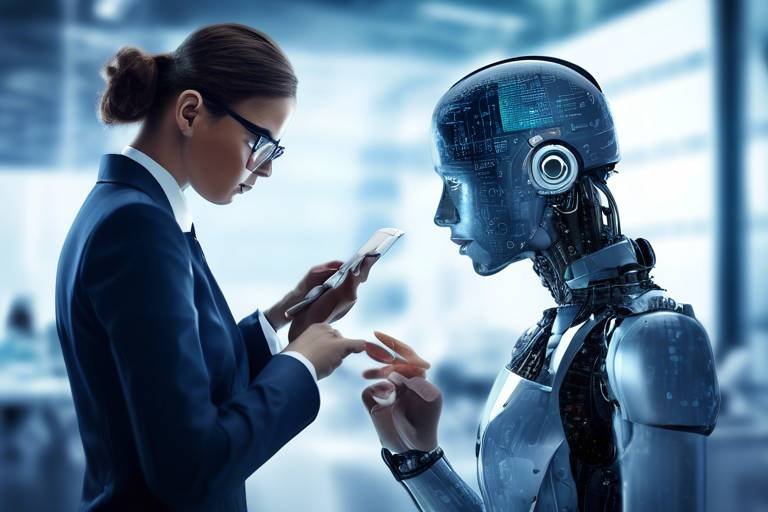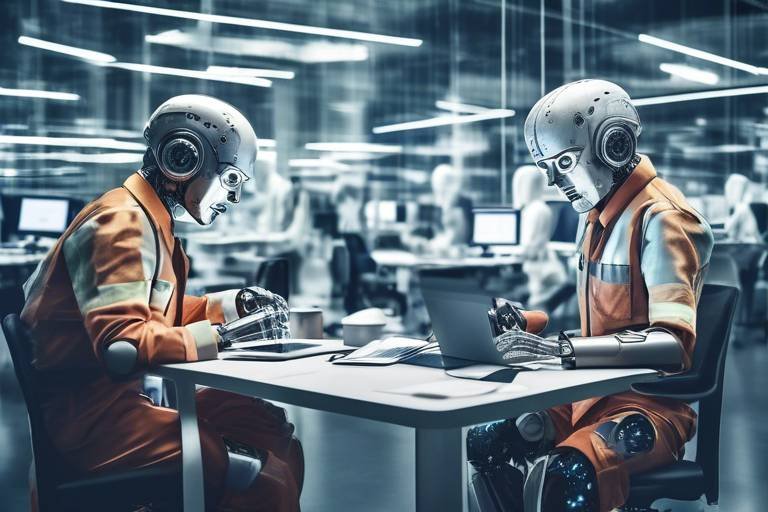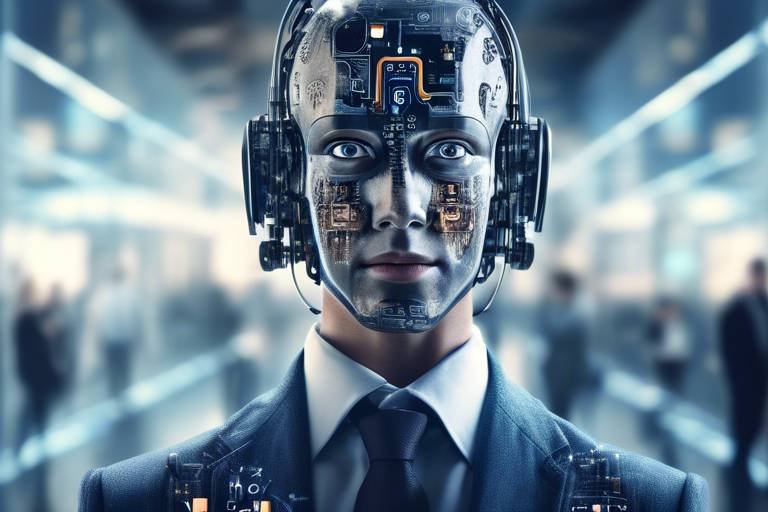AI & The Future of Work: An Emerging Paradigm Shift
As we stand on the brink of a technological revolution, artificial intelligence (AI) is no longer just a buzzword; it’s becoming a fundamental part of our workplaces. Imagine walking into an office where your tasks are not only simplified but enhanced by intelligent systems that learn and adapt to your needs. This is the reality that AI is creating, transforming the way we work, interact, and even think about our careers. The integration of AI technologies into business operations is not merely a trend; it’s a vital shift that is reshaping industries and redefining job roles across the globe.
The rise of AI is akin to the introduction of the internet in the late 20th century—an innovation that fundamentally changed how we communicate, conduct business, and live our lives. Today, AI systems are being deployed across various sectors, from healthcare to finance, and their impact is palpable. Companies are leveraging AI to enhance productivity and efficiency, automate mundane tasks, and ultimately drive growth. In this rapidly evolving landscape, understanding the implications of AI on the workforce is crucial. How will it affect job security? What skills will be necessary to thrive? These questions are at the forefront of discussions among employees, employers, and policymakers alike.
As we delve deeper into the implications of AI in the workplace, we must consider both the opportunities and challenges it presents. On one hand, AI can take over repetitive tasks, allowing employees to focus on more creative and strategic endeavors. On the other hand, there is a genuine concern about job displacement, particularly in roles that involve routine tasks. The key to navigating this new paradigm lies in our ability to adapt and evolve alongside these technologies. In the following sections, we will explore how AI is influencing employment trends, the importance of reskilling and upskilling, and the exciting new job opportunities that are emerging as a result.
AI is making waves in the workplace, and its rise can be attributed to several factors. Businesses are increasingly recognizing the potential of AI to streamline operations and improve decision-making processes. From chatbots that handle customer inquiries to sophisticated algorithms that analyze vast amounts of data, the applications of AI are diverse and impactful. But what does this mean for the average worker? Is AI a friend or foe?
Let’s take a closer look at how AI is enhancing productivity:
| AI Application | Impact on Productivity |
|---|---|
| Automated Customer Support | Reduces response time, improves customer satisfaction |
| Data Analysis Tools | Provides actionable insights, enhances decision-making |
| Predictive Maintenance | Minimizes downtime, saves costs |
As you can see from the table above, the integration of AI applications not only boosts productivity but also allows employees to focus on higher-value tasks, ultimately fostering a more innovative and dynamic work environment.
With every technological advancement comes a shift in employment trends. AI is no different. As we embrace these intelligent systems, we must also acknowledge the dual nature of their impact: job creation and job loss. While some roles may become obsolete, new opportunities are emerging that require advanced technical skills.
For instance, jobs related to AI management, data analysis, and ethical AI oversight are on the rise. These roles demand a unique blend of technical proficiency and soft skills, such as communication and teamwork, to navigate the complexities of AI integration. So, what does this mean for the workforce? It means that adaptability will be the name of the game.
- How will AI affect job security? AI will likely displace some jobs while creating new ones that require different skills.
- What skills will be essential for the future workforce? Adaptability, critical thinking, and technical skills like programming and data analysis will be crucial.
- Can AI improve workplace collaboration? Yes, AI can enhance decision-making and creativity by complementing human skills.

The Rise of AI in the Workplace
Artificial Intelligence (AI) is no longer a concept confined to science fiction; it has become a driving force in the modern workplace. From automating mundane tasks to providing sophisticated data analysis, AI is reshaping how businesses operate across various sectors. Imagine a world where machines not only assist us but also enhance our productivity and efficiency—this is the reality we are stepping into. As companies increasingly integrate AI technologies into their operations, the question arises: how do these advancements affect our daily work lives?
One of the most notable changes brought about by AI is the way it streamlines business processes. For instance, AI algorithms can analyze vast amounts of data much faster than any human could, allowing organizations to make informed decisions in real-time. This capability is particularly beneficial in industries like finance, healthcare, and marketing, where data-driven insights can lead to more effective strategies and improved outcomes. Moreover, AI can handle repetitive tasks with precision, freeing up human employees to focus on more creative and strategic endeavors.
Consider the impact of AI on customer service. Chatbots powered by AI can manage customer inquiries 24/7, providing instant responses and resolving issues without human intervention. This not only enhances the customer experience but also reduces the workload on human staff, allowing them to tackle more complex problems. The integration of AI in customer service exemplifies how technology can complement human efforts, creating a more efficient system overall.
However, the rise of AI in the workplace is not without its challenges. As businesses adopt these technologies, they must also navigate the complexities of implementation and integration. Companies need to invest in training their workforce to work alongside AI systems effectively. This leads us to an essential point: the importance of reskilling and upskilling employees to ensure they can thrive in an AI-enhanced environment.
Furthermore, the integration of AI raises questions about job displacement. While AI can take over certain tasks, it also creates new opportunities that require a different set of skills. For example, roles in AI management, data analysis, and ethical AI oversight are emerging as vital components of the workforce. To illustrate this shift, let’s take a look at the types of roles that are likely to gain prominence:
| Job Role | Description |
|---|---|
| AI Manager | Oversees AI implementation and ensures alignment with business goals. |
| Data Analyst | Interprets data generated by AI systems to inform decision-making. |
| Ethical AI Specialist | Ensures AI systems operate fairly and without bias. |
As we navigate this new landscape, it's crucial to embrace the changes AI brings to the workplace. Instead of fearing job loss, we should focus on the potential for growth and innovation. After all, just as the industrial revolution transformed labor, AI is set to redefine our work in ways we are only beginning to understand. The key lies in our ability to adapt and learn in this evolving environment.
In conclusion, the rise of AI in the workplace is not just a trend; it represents a profound shift in how we approach work itself. By leveraging AI technologies, businesses can enhance productivity while also creating new roles that demand innovative skills. It's an exciting time to be part of the workforce, as we stand on the brink of a new era defined by collaboration between humans and machines.
- What is AI's role in the workplace? AI enhances productivity by automating tasks and providing data-driven insights.
- Will AI take away jobs? While AI may displace some roles, it also creates new opportunities that require advanced skills.
- How can employees adapt to AI integration? Reskilling and upskilling are crucial for employees to thrive in an AI-enhanced workplace.

Impact on Employment Trends
The advent of artificial intelligence (AI) is not just a technological revolution; it’s a seismic shift that is reshaping the very fabric of our workforce. As AI becomes more integrated into various industries, we are witnessing a dramatic transformation in employment trends. While some may fear that AI will lead to widespread job losses, the reality is far more nuanced. In fact, AI is creating a new landscape of opportunities, but it also demands a shift in the skills that workers need to thrive.
One of the most significant impacts of AI on employment is the **disruption of traditional job roles**. Many positions that once required human intervention are now being automated. For instance, in sectors such as manufacturing and logistics, robots and AI systems are taking over repetitive tasks, enhancing efficiency and reducing costs. However, this automation comes with a double-edged sword; while it may eliminate certain jobs, it also paves the way for new roles that require a different set of skills. This phenomenon is often referred to as "creative destruction," where old jobs are replaced by new opportunities that did not previously exist.
Moreover, the integration of AI is leading to the emergence of roles that focus on managing and interpreting AI systems. Jobs like AI ethics officer, data analyst, and machine learning engineer are becoming increasingly vital. These positions not only require advanced technical skills but also a deep understanding of how AI impacts business operations and societal norms. As companies strive to harness the power of AI, they will seek out individuals who can bridge the gap between technology and human insight.
To illustrate the changing landscape, consider the following table that highlights the **shifts in job roles** across various sectors:
| Industry | Traditional Roles | Emerging Roles |
|---|---|---|
| Manufacturing | Assembly Line Worker | Automation Technician |
| Healthcare | Radiologist | AI Health Data Analyst |
| Finance | Bank Teller | AI Risk Management Specialist |
| Retail | Cashier | Customer Experience Analyst |
As we navigate this new terrain, it’s essential to recognize that **not all jobs are equally affected** by AI. While roles that involve repetitive tasks may be at higher risk, positions requiring creativity, emotional intelligence, and complex problem-solving are likely to flourish. This shift emphasizes the importance of **reskilling and upskilling** the current workforce to adapt to these changes. Companies and governments alike are beginning to invest in training programs that equip employees with the skills necessary to excel in an AI-driven economy.
In summary, the impact of AI on employment trends is profound. While it brings challenges, it also opens doors to new opportunities. As we embrace this transformation, it’s crucial for both workers and employers to stay ahead of the curve by fostering a culture of continuous learning and adaptability. After all, in this rapidly changing world, the ability to evolve is the key to success.
- Will AI take away my job? - While AI may automate certain tasks, it also creates new job opportunities that require different skill sets.
- What skills will be in demand in the future? - Skills such as data analysis, programming, and soft skills like communication and teamwork will be crucial.
- How can I prepare for an AI-driven job market? - Consider reskilling or upskilling through online courses, workshops, and continuous learning opportunities.

Automation and Job Displacement
As we delve into the realm of automation, it's crucial to recognize its profound impact on job displacement across various sectors. Automation, driven by advancements in artificial intelligence (AI), has the potential to transform the workplace, but it also raises significant concerns regarding employment. Imagine a factory floor where robots perform repetitive tasks with precision and speed, leaving human workers to ponder their future roles. This scenario is becoming increasingly common, and while automation can enhance productivity, it can also lead to the elimination of certain jobs, particularly those involving routine and manual labor.
According to recent studies, industries like manufacturing, retail, and even some service sectors are experiencing a wave of automation that threatens traditional job roles. For instance, a report from the World Economic Forum indicates that by 2025, over 85 million jobs could be displaced due to the rise of machines. This shift is not merely a technological evolution; it represents a paradigm shift in how we perceive work and employment.
To better understand the implications of automation on job displacement, let's break down some key factors:
- Nature of Tasks: Jobs that involve repetitive and predictable tasks are at the highest risk of being automated. Think about assembly line jobs or data entry positions; these roles can be easily performed by machines.
- Sector Vulnerability: Certain sectors are more vulnerable to automation. For example, manufacturing and transportation are seeing significant automation, while creative fields like art and design are less susceptible.
- Skill Level: Workers with lower skill levels are more likely to be affected by job displacement. Conversely, those with advanced technical skills may find new opportunities emerging as a result of automation.
While the potential for job loss is alarming, it’s essential to recognize that automation can also create new opportunities. As machines take over mundane tasks, human workers can shift their focus to more complex and creative endeavors. This transition may lead to the emergence of new job roles that we can't even imagine today. For instance, positions such as AI trainers, robot maintenance specialists, and data analysts are becoming increasingly relevant.
However, the transition is not without its challenges. Workers displaced by automation often face significant hurdles in finding new employment. The skills gap is a pressing issue; many displaced workers may lack the necessary technical skills to thrive in an AI-driven economy. This scenario underscores the importance of reskilling and upskilling initiatives that can help workers adapt to the changing job landscape.
In conclusion, while automation undoubtedly poses a risk of job displacement, it also offers a unique opportunity for growth and innovation. The key lies in our ability to adapt to these changes. By investing in education and training, we can equip the workforce with the skills needed to navigate this evolving landscape. The future of work may be uncertain, but with the right approach, we can turn challenges into opportunities.
Q1: Will automation completely eliminate jobs?
A1: While automation may displace certain jobs, it is also expected to create new roles that require different skills. The focus should be on reskilling and adapting to these changes.
Q2: What types of jobs are most at risk of automation?
A2: Jobs that involve repetitive tasks, such as assembly line work, data entry, and some customer service roles, are at a higher risk of being automated.
Q3: How can workers prepare for the changes brought by automation?
A3: Workers can prepare by investing in education and training programs that focus on developing technical skills, as well as soft skills like communication and problem-solving.
Q4: Are there any industries that are safe from automation?
A4: Industries that require high levels of creativity, emotional intelligence, and complex human interactions, such as arts, healthcare, and education, are less likely to be fully automated.

Reskilling and Upskilling Initiatives
As the landscape of work continues to evolve due to the rise of artificial intelligence, the importance of reskilling and upskilling initiatives cannot be overstated. Companies are increasingly recognizing that their workforce must adapt to new technologies and methodologies to remain competitive. This shift isn't just beneficial for businesses; it also empowers employees to take charge of their career trajectories. Imagine being a ship captain navigating through uncharted waters—without the right skills and tools, you might just drift aimlessly. Similarly, workers need the right training to steer their careers in the right direction amidst the AI revolution.
Reskilling refers to the process of learning new skills to perform a different job, while upskilling involves enhancing existing skills to improve performance in the current role. Both are essential in a world where job descriptions are constantly changing. Organizations that invest in these initiatives not only enhance their operational efficiency but also foster a culture of continuous learning. This culture can lead to higher employee satisfaction and retention rates, as workers feel valued and supported in their professional growth.
To effectively implement reskilling and upskilling programs, companies can adopt various strategies. For instance, they can:
- Conduct skills assessments to identify gaps and opportunities for development.
- Offer tailored training programs that focus on both technical and soft skills.
- Utilize online platforms that provide flexible learning options, allowing employees to learn at their own pace.
- Encourage mentorship and peer-to-peer learning to foster collaboration and knowledge sharing.
Moreover, partnerships with educational institutions can provide employees with access to cutting-edge courses and certifications. These collaborations can create a pipeline of talent that is not only skilled but also aligned with the needs of the industry. Think of it as planting seeds in a garden; with the right nurturing, those seeds can grow into a robust ecosystem of skilled professionals ready to tackle the challenges of tomorrow.
In addition to organizational efforts, individuals also have a role to play in their own reskilling and upskilling journeys. Embracing a mindset of lifelong learning can open doors to new opportunities and help workers stay relevant in an increasingly automated world. Whether it’s enrolling in workshops, pursuing online courses, or simply staying updated with industry trends, the proactive approach will yield rewards in the long run.
In summary, reskilling and upskilling initiatives are not just buzzwords; they are essential strategies for navigating the future of work. As AI continues to reshape industries, both employers and employees must prioritize these initiatives to ensure a sustainable and prosperous workforce. The collaboration between organizations and their employees can create a dynamic environment where everyone thrives, much like a well-oiled machine that operates efficiently and effectively.
Q: What is the difference between reskilling and upskilling?
A: Reskilling involves learning new skills for a different job, while upskilling focuses on enhancing existing skills for the current role.
Q: Why are reskilling and upskilling important in the age of AI?
A: These initiatives help workers adapt to changing job requirements and technologies, ensuring they remain competitive and relevant in the job market.
Q: How can companies implement effective reskilling and upskilling programs?
A: Companies can conduct skills assessments, offer tailored training programs, utilize online learning platforms, and encourage mentorship.
Q: What role do individuals play in their own reskilling and upskilling?
A: Individuals should embrace lifelong learning by enrolling in workshops, pursuing online courses, and staying updated with industry trends.

New Job Opportunities
As artificial intelligence (AI) continues to integrate into various sectors, it doesn't just threaten existing jobs; it also opens up a plethora of that demand a different set of skills and expertise. Think of AI as a powerful engine driving innovation; it’s not just about replacing old jobs, but about creating new avenues for employment that were previously unimaginable. For instance, roles such as AI specialists, who develop and maintain AI systems, are becoming increasingly essential. These professionals are tasked with ensuring that AI technologies are not only effective but also ethical and aligned with organizational goals.
Moreover, the rise of AI has led to a surge in demand for data analysts. In a world where decisions are driven by data, companies are on the lookout for individuals who can interpret complex datasets and derive actionable insights. This role is pivotal as organizations strive to harness the full potential of AI, making the ability to analyze data a highly sought-after skill. Data analysts are the navigators in the vast ocean of information, guiding companies toward informed decisions.
Another exciting opportunity lies in the realm of AI ethics and compliance. As AI systems become more prevalent, the need for professionals who can oversee ethical AI practices is paramount. These roles involve ensuring that AI algorithms are fair, transparent, and devoid of biases. Imagine being the guardian of AI, ensuring that technology serves humanity rather than undermining it. This position not only requires technical knowledge but also a strong understanding of ethical considerations and regulatory frameworks.
Additionally, the emergence of AI trainers is another fascinating development. These individuals are responsible for teaching AI systems how to recognize patterns and make decisions. It’s akin to being a teacher to a very advanced student who needs guidance to learn effectively. AI trainers play a crucial role in improving the accuracy and efficiency of AI systems, making them invaluable in any organization leveraging AI technology.
To summarize, as AI continues to evolve, so too will the job market. The following table outlines some of the new job opportunities arising from AI integration:
| Job Title | Description | Key Skills |
|---|---|---|
| AI Specialist | Develops and maintains AI systems. | Programming, Machine Learning, Problem-solving |
| Data Analyst | Interprets complex datasets to provide insights. | Data Analysis, Statistical Skills, Critical Thinking |
| AI Ethics Officer | Ensures AI practices are ethical and comply with regulations. | Ethics, Compliance, Communication |
| AI Trainer | Teaches AI systems to recognize patterns. | Machine Learning, Teaching Skills, Patience |
In conclusion, the future job landscape is being reshaped by AI, presenting exciting and diverse opportunities for those willing to adapt and learn. Embracing these changes not only prepares individuals for the evolving workforce but also positions them at the forefront of a technological revolution. Are you ready to explore these new horizons?
- What types of new jobs are emerging due to AI? New jobs include AI specialists, data analysts, AI ethics officers, and AI trainers, among others.
- How can I prepare for a career in AI? Gaining skills in programming, data analysis, and understanding AI ethics can be beneficial.
- Will AI replace all jobs in the future? While AI may automate some tasks, it will also create new opportunities that require human skills.
- What role do soft skills play in an AI-driven workplace? Soft skills like communication, teamwork, and emotional intelligence are increasingly important in collaborating with AI systems.

Collaboration Between Humans and AI
In today's rapidly evolving work environment, the partnership between humans and artificial intelligence (AI) is becoming increasingly vital. Imagine a world where machines don't just replace human effort but actually enhance our capabilities. This is not some distant future; it's happening right now! AI technologies are designed to assist us, making our work more efficient and allowing us to focus on tasks that require creativity and critical thinking. Rather than viewing AI as a competitor, we should see it as a powerful ally that can help us tackle complex problems and drive innovation.
Take, for instance, the healthcare sector. AI tools can analyze vast amounts of patient data at lightning speed, identifying patterns that even the most experienced doctors might miss. This collaboration enables healthcare professionals to make better-informed decisions, leading to improved patient outcomes. It’s like having a supercharged assistant who can sift through mountains of information in seconds, allowing doctors to spend more time with their patients rather than buried in paperwork.
Moreover, AI can significantly enhance creativity in fields such as marketing and design. By analyzing consumer behavior and preferences, AI can provide insights that help marketers tailor their campaigns more effectively. This synergy allows creative professionals to focus on crafting compelling narratives and innovative strategies, while AI handles data crunching in the background. It’s a bit like having a brainstorming buddy who always brings fresh ideas to the table!
However, successful collaboration between humans and AI requires a shift in mindset. Employees need to embrace the technology and understand that it is here to augment their work rather than replace them. This means developing a new set of skills that complement AI capabilities. For example, while AI can handle data analysis, humans excel in emotional intelligence and ethical decision-making. Together, they can create a balanced approach to problem-solving that leverages the strengths of both.
To facilitate this collaboration, organizations must invest in training programs that prepare employees for an AI-enhanced workplace. This includes not only technical training but also fostering a culture of adaptability and openness to change. By encouraging employees to engage with AI tools, companies can create a workforce that is not only more efficient but also more innovative.
In conclusion, the collaboration between humans and AI holds immense potential for transforming industries and improving job satisfaction. By working together, we can harness the power of AI to not only boost productivity but also enhance creativity and decision-making. The future of work is not about humans versus machines; it’s about humans and machines working together to create a better, more efficient world.
- How does AI enhance human creativity?
AI provides valuable insights and data analysis, allowing humans to focus on creative aspects of their work. - What skills do I need to work effectively with AI?
Adaptability, technical proficiency, and emotional intelligence are key skills for collaborating with AI. - Can AI replace all jobs?
No, while AI may automate certain tasks, it also creates new roles that require human skills.

Ethical Considerations in AI Deployment
The rise of artificial intelligence in the workplace brings with it a host of ethical considerations that cannot be overlooked. As businesses increasingly rely on AI technologies to streamline operations and enhance productivity, the implications of these technologies on society, the workforce, and individual rights must be carefully examined. One of the most pressing concerns is the potential for bias in AI algorithms, which can lead to unfair treatment of employees based on race, gender, or other characteristics. This bias can manifest in various ways, such as in hiring practices, performance evaluations, and promotions, ultimately affecting the diversity and inclusivity of the workplace.
Moreover, the question of privacy looms large in the realm of AI deployment. With AI systems often requiring vast amounts of data to function effectively, the risk of compromising sensitive employee information is significant. Companies must navigate the fine line between utilizing data to improve efficiency and respecting the privacy rights of their employees. This necessitates the implementation of robust data protection policies and practices that prioritize the security of personal information.
Another critical aspect of ethical AI deployment is the need for responsible governance. Organizations should establish clear guidelines and frameworks for the use of AI technologies, ensuring that they are aligned with ethical standards and societal values. This involves fostering a culture of transparency where employees are aware of how AI is being used in their workplace and how it impacts their roles. By promoting open communication and encouraging feedback, companies can build trust among their workforce and mitigate concerns related to AI deployment.
To further illustrate these ethical considerations, consider the following table that outlines key challenges and potential strategies for addressing them:
| Ethical Challenge | Potential Strategy |
|---|---|
| Algorithmic Bias | Implement regular audits of AI systems to identify and rectify biases. |
| Data Privacy | Establish strict data governance policies that prioritize employee consent and data security. |
| Lack of Transparency | Develop clear communication channels to inform employees about AI usage and its implications. |
As we move forward into an era dominated by AI, it is imperative for organizations to prioritize ethical considerations in their deployment strategies. By addressing biases, safeguarding privacy, and fostering transparency, companies can harness the power of AI while ensuring that they operate responsibly and ethically. This not only benefits the organization but also contributes to a more equitable and just workplace for all.
- What are the main ethical concerns related to AI in the workplace? The primary concerns include algorithmic bias, data privacy, and lack of transparency in AI decision-making processes.
- How can companies address bias in AI systems? Companies can conduct regular audits and implement corrective measures to ensure fairness and equity in AI algorithms.
- Why is data privacy important in AI deployment? Protecting employee data is crucial to maintaining trust and complying with legal regulations regarding personal information.
- What role does transparency play in AI ethics? Transparency fosters trust among employees and allows for informed discussions about the use of AI technologies in the workplace.

Ensuring Fairness and Transparency
As we navigate the complex landscape of artificial intelligence in the workplace, ensuring fairness and transparency in AI algorithms is paramount. The integration of AI systems in hiring, promotions, and performance evaluations can inadvertently perpetuate biases if not carefully managed. Imagine a scenario where an AI system evaluates candidates for a job based solely on historical data; if that data is biased, the AI will likely replicate those biases, leading to unfair outcomes. This is why it is essential to implement strategies that promote equitable treatment across all levels of employment.
One effective approach to achieving fairness in AI is through the development of robust auditing mechanisms. These mechanisms can help identify and mitigate biases in algorithms by regularly reviewing the data inputs and the decision-making processes of AI systems. By conducting audits, organizations can ensure that their AI systems are not only compliant with ethical standards but also aligned with their values of diversity and inclusion.
Moreover, fostering a culture of transparency is crucial. Companies can achieve this by openly sharing information about how their AI systems function and the data they utilize. When employees understand the algorithms that impact their careers, they are more likely to trust the processes in place. Transparency can also be enhanced through the use of explainable AI (XAI), which focuses on making AI systems more interpretable to human users. This allows individuals to comprehend how decisions are made, which is particularly important in sensitive areas such as hiring and promotions.
To further illustrate the importance of fairness and transparency in AI, consider the following table that outlines key strategies organizations can adopt:
| Strategy | Description |
|---|---|
| Regular Audits | Conduct systematic reviews of AI algorithms to identify biases and ensure compliance with ethical standards. |
| Explainable AI | Implement AI systems that provide clear explanations for their decisions, enhancing user understanding and trust. |
| Stakeholder Engagement | Involve diverse groups in the development and deployment of AI systems to ensure multiple perspectives are considered. |
| Data Diversity | Utilize diverse datasets to train AI models, reducing the risk of bias and improving the overall fairness of outcomes. |
In addition to these strategies, organizations should prioritize stakeholder engagement. By involving a diverse group of individuals in the design and implementation of AI systems, companies can gain valuable insights that help mitigate biases. This collaborative approach fosters a sense of ownership and accountability, ultimately leading to more equitable outcomes.
In conclusion, the path to ensuring fairness and transparency in AI is not just a technical challenge; it is a moral imperative. As AI continues to shape the future of work, organizations must commit to ethical practices that prioritize fairness and transparency. By doing so, they can build a workplace culture that values diversity and equity, ensuring that every employee feels valued and respected.
- What are the main ethical concerns related to AI in the workplace?
The main concerns include bias in AI algorithms, data privacy issues, and the potential for job displacement.
- How can organizations ensure their AI systems are fair?
By implementing regular audits, utilizing diverse datasets, and fostering transparency in AI decision-making processes.
- What is explainable AI?
Explainable AI refers to AI systems designed to provide clear and understandable explanations for their decisions, which helps users trust and comprehend the technology.

Data Privacy and Security Challenges
As artificial intelligence (AI) continues to permeate the workplace, it brings with it a plethora of data privacy and security challenges that organizations must navigate. The integration of AI systems often involves the collection and analysis of vast amounts of personal data, raising significant concerns regarding how this information is handled. In an age where data breaches make headlines almost daily, businesses are under immense pressure to ensure that their AI implementations do not compromise the privacy of their employees or customers.
One of the primary issues is the potential for data misuse. AI systems can analyze data to identify trends and make predictions, but this capability can also lead to the unauthorized use of sensitive information. For example, if an AI system is trained on biased or incomplete data, it may produce results that unfairly disadvantage certain groups, leading to ethical dilemmas and potential legal repercussions. Organizations must be vigilant in implementing robust data governance frameworks to mitigate these risks.
Moreover, the complexity of AI algorithms often obscures the decision-making processes involved, creating a lack of transparency that can further complicate privacy concerns. Employees and customers alike may not fully understand how their data is being used, which can erode trust in the organization. To address this, companies should strive for transparency in their AI operations, ensuring that individuals are informed about how their data is collected, stored, and utilized.
Another significant challenge is the issue of data security. As AI systems become more sophisticated, they also become more attractive targets for cybercriminals. The consequences of a data breach can be catastrophic, leading to financial losses, reputational damage, and legal liabilities. To safeguard against these threats, organizations must invest in advanced cybersecurity measures, including:
- Regular security audits and assessments
- Employee training on data security best practices
- Implementation of encryption technologies
- Continuous monitoring of AI systems for vulnerabilities
Furthermore, organizations must also comply with various data protection regulations, such as the General Data Protection Regulation (GDPR) in Europe and the California Consumer Privacy Act (CCPA) in the United States. These laws impose strict requirements on how personal data can be collected, processed, and stored, and non-compliance can result in hefty fines. Thus, understanding and adhering to these regulations is crucial for any organization leveraging AI technologies.
In conclusion, while AI presents numerous opportunities for enhancing workplace efficiency and productivity, it also poses significant data privacy and security challenges that cannot be overlooked. Organizations must take a proactive approach to address these issues by implementing robust data governance policies, ensuring transparency in AI operations, and investing in cybersecurity measures. Only then can they harness the full potential of AI while safeguarding the privacy and security of their data.
- What are the primary data privacy concerns associated with AI? Data privacy concerns include data misuse, lack of transparency, and unauthorized access to sensitive information.
- How can organizations ensure the security of their AI systems? Organizations can ensure security by conducting regular audits, implementing encryption, and training employees on data protection practices.
- What regulations should companies be aware of regarding data privacy? Companies should be aware of regulations such as GDPR and CCPA, which set strict guidelines for data collection and processing.

The Future Skills Landscape
The landscape of skills required for the future workforce is undergoing a dramatic transformation, largely driven by the rise of artificial intelligence (AI) and automation. As we move deeper into the 21st century, it’s not just about having a degree or technical know-how; it’s about adaptability, critical thinking, and a blend of both soft and technical skills that will define success in the workplace. Imagine navigating a rapidly changing environment where the only constant is change itself—this is the reality many workers will face.
In this new era, workers must be versatile. The days of sticking to a single skill set are fading away, replaced by a demand for continuous learning and the ability to pivot quickly. The key skills that are emerging as essential for future employment include:
- Adaptability: The ability to adjust to new technologies and workflows is crucial. Workers who can learn and apply new skills quickly will thrive.
- Critical Thinking: As AI takes over routine tasks, the human ability to analyze situations, make decisions, and solve complex problems becomes invaluable.
- Technical Proficiency: Familiarity with AI tools, programming languages, and data analysis will be essential. Understanding how to work alongside AI systems will set candidates apart.
Moreover, soft skills are becoming increasingly important in this AI-driven world. Communication, teamwork, and emotional intelligence are skills that machines cannot replicate. In an environment where collaboration with AI is commonplace, being able to effectively communicate ideas, work in teams, and empathize with colleagues will be vital. Employers are now looking for individuals who can bridge the gap between technology and human interaction.
To illustrate the shifting skills landscape, consider the following table that highlights the key skills expected to be in high demand in the coming years:
| Skill Type | Description | Examples |
|---|---|---|
| Soft Skills | Interpersonal skills that enhance teamwork and communication. | Emotional intelligence, adaptability, conflict resolution |
| Technical Skills | Skills related to technology and data manipulation. | Programming, data analysis, machine learning |
| Creative Skills | Innovative thinking and problem-solving abilities. | Design thinking, strategic planning, creative writing |
As we look to the future, it's clear that the workforce will need to evolve. Educational institutions and businesses alike must prioritize reskilling and upskilling initiatives to prepare workers for these new demands. This means investing in training programs that focus not only on technical skills but also on enhancing soft skills that foster collaboration and creativity.
In conclusion, the future skills landscape is not just about technical know-how; it’s about creating a workforce that is adaptable, innovative, and capable of working effectively alongside AI. As we embrace this new paradigm, let’s remember that the human element—our ability to think critically, communicate effectively, and empathize—will always be our greatest asset in the workplace.
Q: What are the most important skills for the future workforce?
A: The most important skills include adaptability, critical thinking, technical proficiency, and soft skills such as communication and teamwork.
Q: How can I prepare for the future job market?
A: You can prepare by focusing on continuous learning, seeking out reskilling opportunities, and developing both technical and soft skills.
Q: Will AI replace all jobs?
A: While AI will automate certain tasks, it will also create new job opportunities that require human skills. The focus will be on collaboration between humans and AI.

Soft Skills in an AI World
As we navigate through the transformative landscape shaped by artificial intelligence, one thing becomes crystal clear: the importance of soft skills is skyrocketing. While AI excels at performing repetitive tasks and crunching vast amounts of data, it lacks the human touch that is essential for effective communication, empathy, and teamwork. Think of AI as a powerful tool—like a high-tech calculator. It can solve complex problems, but it can't engage in a heart-to-heart conversation or inspire a team to rally around a common goal.
In an era where machines handle mundane tasks, professionals will need to pivot and cultivate their interpersonal skills. This shift is not just a trend; it’s a necessity. Employers are increasingly recognizing that the ability to collaborate, adapt, and communicate effectively can make the difference between a good employee and a great one. For instance, consider the following soft skills that are becoming invaluable:
- Communication: The ability to convey ideas clearly and persuasively is more critical than ever. Whether it’s through writing, speaking, or even non-verbal cues, effective communication helps in building relationships and facilitating teamwork.
- Emotional Intelligence: Understanding and managing one’s emotions, as well as empathizing with others, is vital in fostering a positive workplace culture. It enables individuals to navigate social complexities and resolve conflicts amicably.
- Adaptability: The workplace is evolving faster than ever, and being adaptable means thriving in change. Those who can pivot quickly and embrace new challenges will be the ones leading the charge.
- Critical Thinking: In a world inundated with information, the ability to analyze data critically and make informed decisions is a game-changer. This skill empowers individuals to assess situations and devise effective solutions.
Moreover, the rise of remote work has further emphasized the need for strong soft skills. With teams often dispersed across the globe, the ability to communicate clearly and collaborate effectively through digital platforms is essential. In fact, studies show that companies that prioritize soft skills in their hiring processes tend to have more cohesive teams and higher employee satisfaction.
As we look towards the future, it’s clear that while technical skills will get your foot in the door, soft skills will open the door to opportunity. Professionals who invest time and effort into honing these abilities will not only enhance their employability but also contribute to a more harmonious and productive workplace. So, how can one develop these soft skills? It’s all about practice and engagement. Join workshops, seek feedback, and actively participate in team projects. Remember, just like any skill, the more you practice, the better you get!
Q: Why are soft skills important in an AI-driven workplace?
A: Soft skills are crucial because they enable effective communication, teamwork, and adaptability, which are essential in an environment where AI handles technical tasks.
Q: How can I improve my soft skills?
A: You can improve your soft skills by participating in workshops, seeking feedback, and engaging in team activities that require collaboration and communication.
Q: Are soft skills more important than technical skills?
A: Both soft and technical skills are important. However, as AI takes over routine tasks, soft skills become increasingly valuable for career advancement and workplace harmony.

Technical Skills for Tomorrow
As we stand on the brink of a technological revolution, the landscape of employment is evolving faster than ever before. In this new era, technical skills are not just an advantage; they are becoming a necessity. The rise of artificial intelligence, big data, and automation is reshaping industries, and individuals must adapt to these changes to thrive. So, what are the technical skills that will be in high demand in the coming years? Let's dive into this exciting world of opportunity!
First and foremost, programming skills are at the forefront of this revolution. Understanding languages like Python, JavaScript, and Java is crucial for anyone looking to enter tech-centric roles. These languages are the backbone of software development and are widely used in AI applications, web development, and data analysis. Companies are on the lookout for individuals who can not only write code but also understand the logic behind it, enabling them to create robust solutions that address complex problems.
Next up, we have data analysis. In a world where data is often referred to as the new oil, the ability to interpret and analyze data is invaluable. Professionals skilled in data visualization tools like Tableau or Power BI, and those who can work with SQL databases, will be highly sought after. These skills allow individuals to extract meaningful insights from vast amounts of data, helping organizations make informed decisions. Imagine being the person who uncovers trends that can drive a company’s strategy—how exciting is that?
Moreover, machine learning expertise is rapidly becoming a hot commodity. As businesses increasingly turn to AI to drive their operations, the demand for professionals who can develop and implement machine learning algorithms is skyrocketing. This involves not just understanding algorithms but also having a grasp of statistics and data preprocessing techniques. Think of it as teaching a computer to learn from data—it's like being a digital mentor!
In addition to these technical skills, familiarity with cloud computing is essential. Platforms like Amazon Web Services (AWS), Microsoft Azure, and Google Cloud are transforming how businesses operate. Knowledge of these platforms allows professionals to manage, store, and analyze data remotely, which is a crucial capability in today’s work environment. The ability to navigate cloud architecture can set you apart in a competitive job market.
To help visualize the importance of these skills, here’s a table summarizing the key technical skills for tomorrow’s workforce:
| Skill | Description | Importance |
|---|---|---|
| Programming | Writing code in languages like Python, Java, and JavaScript. | Essential for software development and automation. |
| Data Analysis | Interpreting data using tools like Tableau and SQL. | Crucial for informed decision-making. |
| Machine Learning | Developing algorithms that enable computers to learn from data. | Key for AI integration in business. |
| Cloud Computing | Managing and analyzing data on cloud platforms. | Vital for modern data management and storage. |
Lastly, it’s important to recognize that while technical skills are critical, they should be complemented by a strong foundation of soft skills. Communication, teamwork, and problem-solving abilities are essential to ensure that technical knowledge translates into real-world solutions. After all, technology is only as effective as the people who wield it!
In conclusion, as we move forward into an AI-driven future, honing these technical skills will not only enhance your employability but also empower you to be at the forefront of innovation. Embrace the change, keep learning, and position yourself as a valuable asset in this exciting new world!
- What technical skills should I focus on? Focus on programming, data analysis, machine learning, and cloud computing to stay relevant in the job market.
- How can I acquire these skills? Consider online courses, coding bootcamps, and workshops to develop these technical abilities.
- Are soft skills still important in a tech-driven world? Absolutely! Soft skills like communication and teamwork are essential for collaboration and effective problem-solving.
Frequently Asked Questions
- How is AI transforming the workplace?
AI is revolutionizing the workplace by automating routine tasks, enhancing productivity, and enabling businesses to make data-driven decisions. This transformation allows employees to focus on more complex and creative aspects of their jobs, ultimately leading to increased efficiency and innovation.
- Will AI lead to job loss?
While AI may displace some jobs, particularly those that involve repetitive tasks, it also creates new opportunities that require advanced skills. The key is for workers to adapt through reskilling and upskilling to meet the demands of the evolving job market.
- What are some new job roles emerging due to AI?
As AI continues to integrate into various industries, new roles are emerging, such as AI management, data analysis, and ethical AI oversight. These positions require a blend of technical expertise and a strong understanding of AI's implications in the workplace.
- How can we ensure fairness in AI systems?
To promote fairness in AI algorithms, organizations must implement strategies that include regular audits, diverse data sets, and transparency in how decisions are made. This helps mitigate biases and ensures equitable outcomes in hiring and promotions.
- What skills will be in high demand in the future?
The future job market will prioritize skills such as adaptability, critical thinking, and technical proficiency. Specifically, technical skills like programming, data analysis, and machine learning expertise will be essential for thriving in an AI-driven economy.
- Why are soft skills important in an AI world?
Soft skills, such as communication, teamwork, and emotional intelligence, are becoming increasingly vital as AI takes over more technical tasks. These skills enhance collaboration between humans and AI, fostering creativity and better decision-making in the workplace.
- What are the ethical concerns surrounding AI in the workplace?
Ethical considerations in AI deployment include issues of bias, data privacy, and the need for responsible governance. Addressing these concerns is crucial to ensure that AI technologies are used fairly and responsibly in the workplace.



















